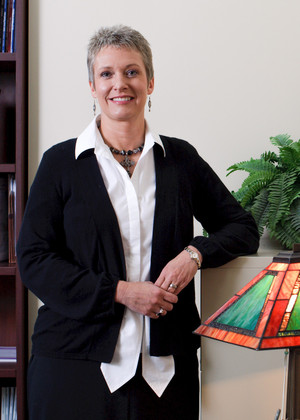New Faculty Orientation helps incoming teachers learn the ropes

CHADRON – Every fall Chadron State College welcomes new students with an extensive orientation program to ease their transition into college life and provide them with information on everything from academic requirements to the location of laundry facilities.
But students aren’t the only ones entering a new realm when fall classes begin, and new teachers can face as many challenges as students in getting acquainted with life at Chadron State, according to Dr. Tracy Nobiling, faculty facilitator for the New Faculty Orientation (NFO) program.
“There’s a huge learning curve for a new college teacher, or even a veteran teacher starting a position at a new school,” said Nobiling, a justice studies professor who is heading the NFO program this year.
CSC provided an orientation for new faculty when Nobiling started teaching some 20 years ago, she said, but it was “just a couple of days before school started” and covered only basic topics such as how to get keys to a room or check out a state vehicle.
Since then the teacher orientation program has gone by a variety of names and has evolved significantly to its present form, which includes one full day before classes start and six, hour-long sessions each semester.
The initial day-long meeting remains focused on basics, including an introduction to the campus, instruction in the college’s course management, testing and grading systems, and guidance in finding support resources and personnel, Nobiling said. A briefing on using computers, viewing screens and Internet access in classrooms is also included.
“When I came we still had chalk boards. That’s all changed,” she said.
The later meetings delve into many different areas, with the overall goal of providing new teachers the guidance and information they need, when they need it, said Nobiling.
“Most of it is directed at either teaching pedagogy or ‘Here’s what we can do to help you help students be successful,’” she said.
Topics covered so far include academic support services for students, planning, policies and procedures, assessment techniques and grading, and professional activities, among others. Each session has an agenda, a list of outcomes, and an extensive list of resources and contacts, with all materials posted online so participants can access them anytime, Nobiling said.
Nobiling and the professional staff members involved in the program follow up after each session and remain connected with participants throughout the year.
“That’s important, just to have somebody to call,” Nobiling said.
Discussion at some of the meetings has taken interesting turns, such as the talk about student use of service animals on campus, said Nobiling. One teacher had encountered the issue previously, while for another it was totally new and a bit perplexing, she said. A talk about academic honesty and student plagiarism was also lively, with varied perspectives from faculty members in different fields of study, Nobiling said.
This year’s NFO group has 10 members; half with previous experience at CSC and half completely new to the campus, according to Nobiling. One participant came to Chadron from Chicago, another from Florida and another from New Orleans.
“It is a diverse group,” she said.
CSC’s orientation program is much better than the one-day meeting provided at a large university where he worked previously, said Brooks Hafey, an assistant professor in the music department.
“I had to fend for myself and often felt lost,” Hafey said. “That experience is the polar opposite of what I have experienced at Chadron State College.”
McKay Tebbs, a first year assistant professor in music, agreed with his colleague, Hafey.
“The first year faculty orientation program helped me a lot by providing needed information and a place where I could bring my questions,” Tebbs said.
Terrie Wood, a lecturer in the business academy, also enjoys the camaraderie provided by the NFO.
“(The NFO is) one of the best I’ve been involved in,” Wood said. “Each meeting is relevant to the immediate needs of the new faculty. The ‘just in time’ format is really good. I like it.”
In addition to the benefits for students and the teachers themselves, the program helps Chadron State by giving new faculty members a sense of how they fit into the overall system, said Nobiling.
“It really is beneficial to see how all the parts fit together,” she said. “It certainly wasn’t something I understood as a new faculty member,” Nobiling said.
A robust NFO helps the college over the long term by making faculty members feel comfortable on campus and in the community, and thus more likely to remain at CSC, Nobiling mentioned.
“The more connected they are, the happier they are going to be, the better they are going to do their job and the more likely they are to stay,” she said. “We talk constantly about retention of students, but without retaining faculty, you aren’t going to succeed either .… We want to do a good job that first year to keep them here.”
Category: Campus News, Employee Awards & Achievements
